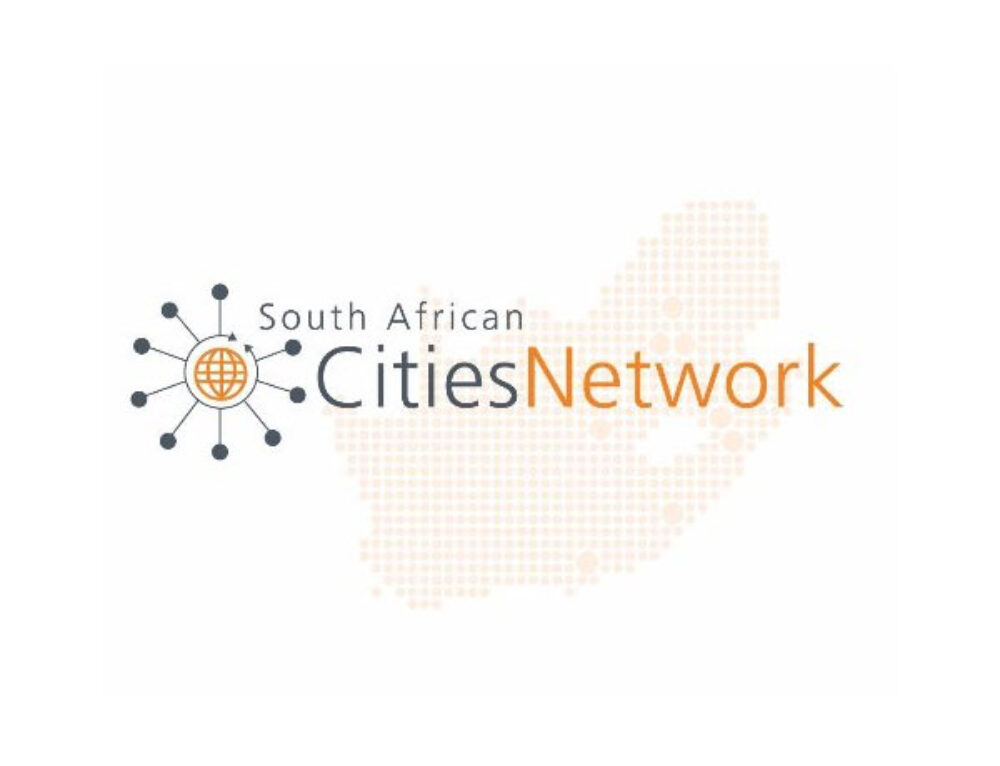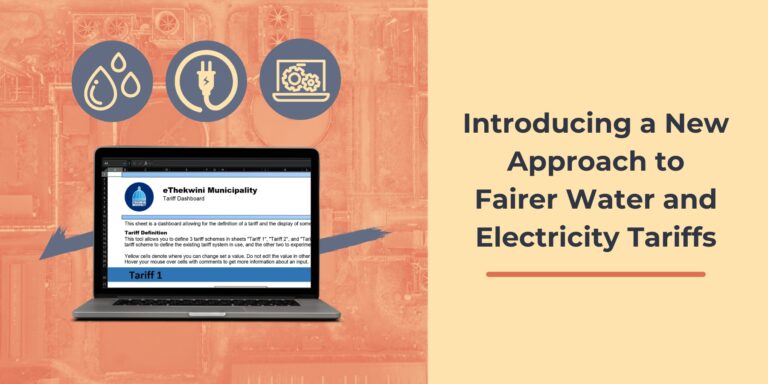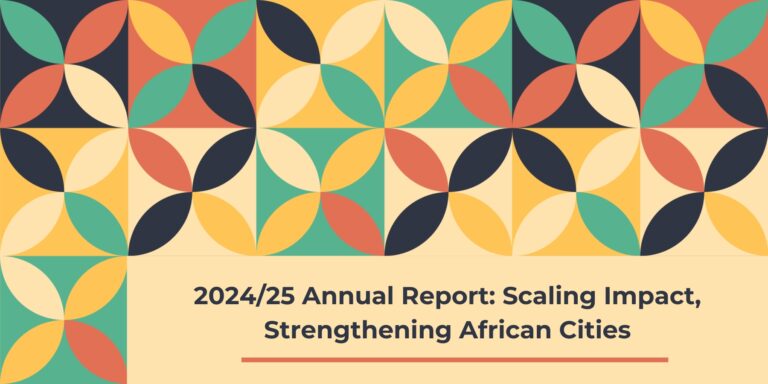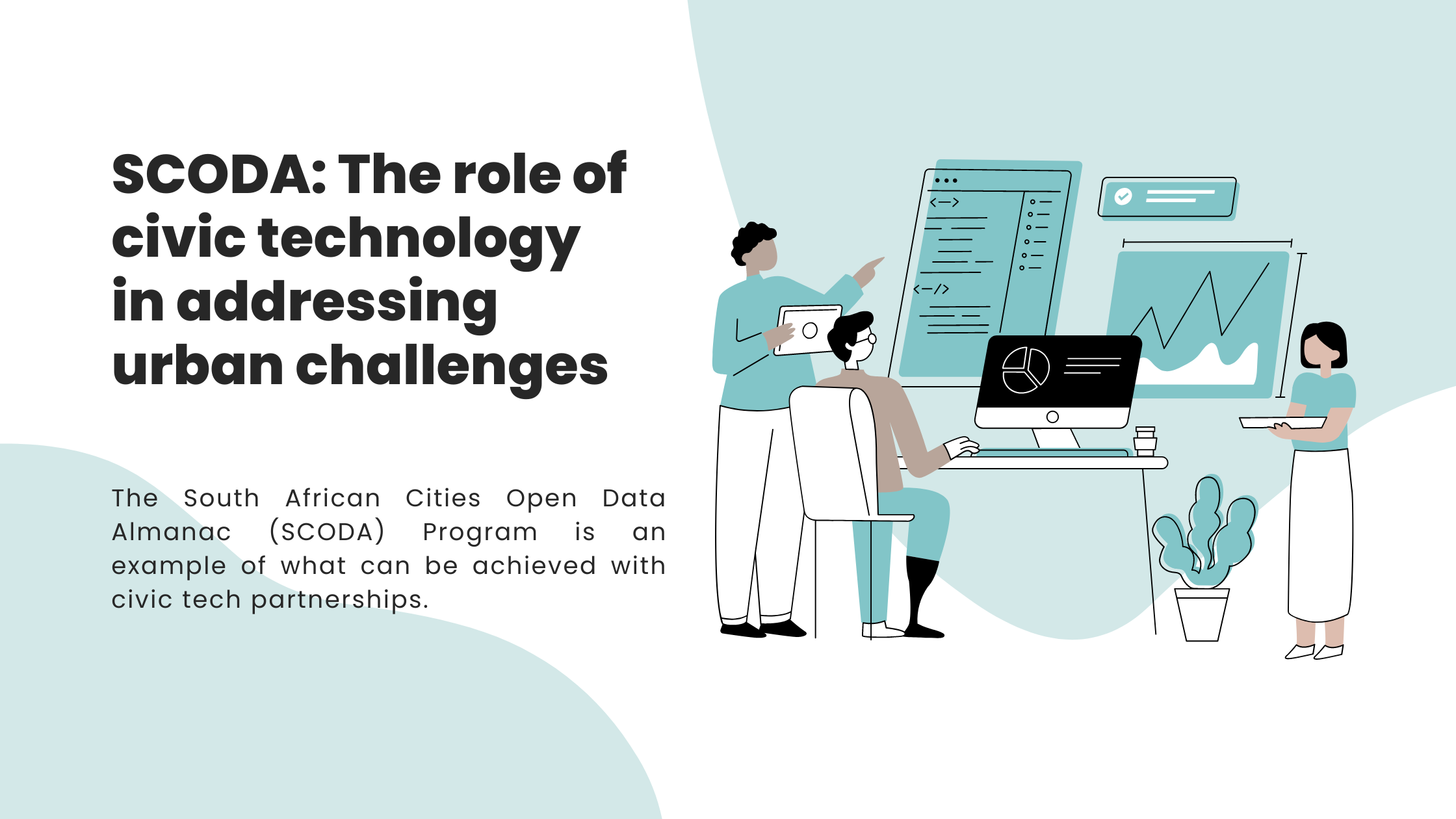
The South African Cities Open Data Almanac (SCODA) program is an example of what can be achieved with civic tech partnerships. The impact achieved through the program emphasises that the future of South African cities depends on each city’s ability to harness the power of technology and innovation in a way that is inclusive, sustainable, and equitable.
This blog post will discuss:
- The role of civic tech in urban development
- The objectives of SCODA as a case study that uses tech to increase civic engagement,
- The impact achieved in establishing South African city indicators
- The progress achieved through the eThekwini Municipality use case and
- Data support projects in Johannesburg and Ekurhuleni Municipality
What is the role of civic technology in urban development?
The discussion around the role of civic technology in urban development has become increasingly important as cities around the world face unprecedented challenges related to climate change, social inequalities, and rapid urbanisation. As the urban population continues to grow, the pressure on cities to find innovative solutions to these challenges has become more urgent. Civic technology offers a promising approach to addressing these issues by leveraging technology and data to increase civic engagement, strengthen the urban data ecosystem, and build participation in decision-making while prioritising marginalised communities and vulnerable communities (Jean Paul et al. 2018).
Civic technology has a role to play in responding to these challenges and supporting opportunities, but the policy environment is not always aligned to support emerging technology solutions. The speed of innovation in Africa may be faster than traditional bureaucratic systems can handle, which presents a barrier to the use of technology and innovation in civic technology.
How do we strengthen the urban data ecosystem, increase civic engagement, and build participation in decision-making while prioritising marginalised communities and vulnerable hidden communities? At Open Cities Lab, our interventions are focused on capacitating local government and civil society organisations in Africa with data skills and tools that will help inform evidence-based decision-making and planning. We use a multidisciplinary approach that focuses on user engagement, with a unique response tailored to each city or organisation’s environment of maturity, understanding, data literacy, and lines of authority.
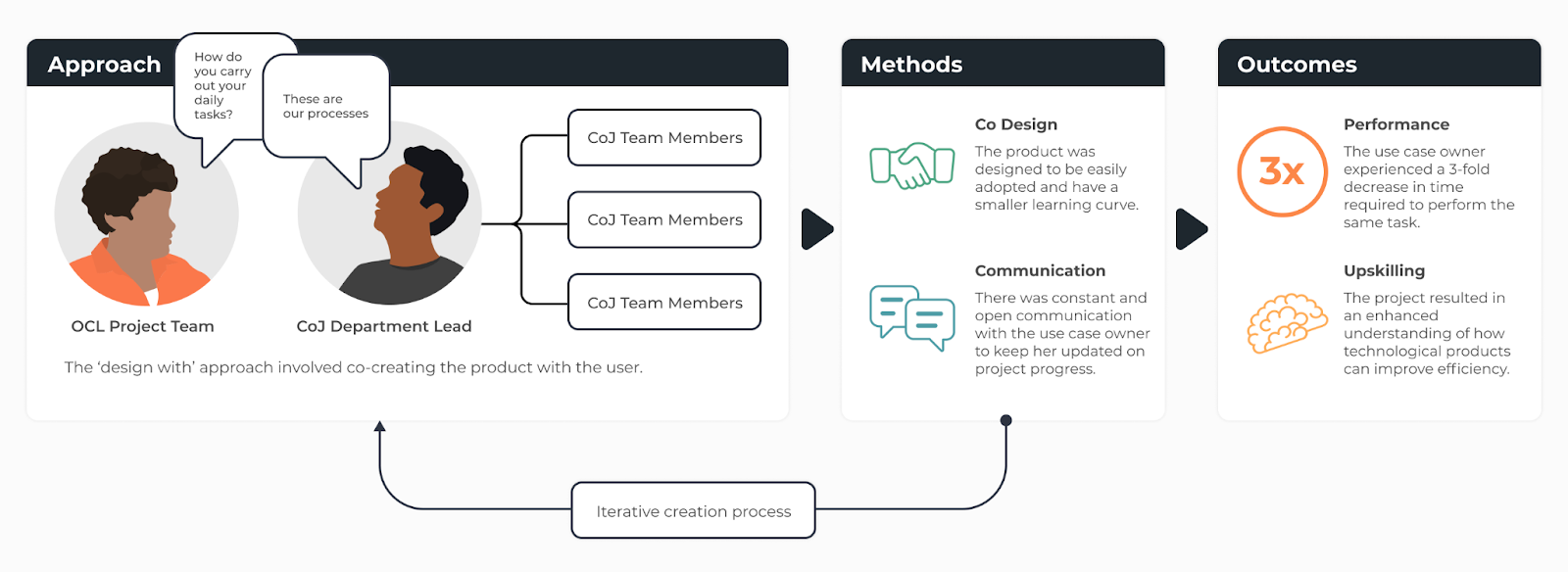
SCODA is an example where we were able to create tools for and with South African cities and the South African Cities Network. As demonstrated below, it also provided opportunities for capacity building and troubleshooting in city departments using a combination of SACN and OCL offerings.
What is SCODA?
The SCODA program digitised the work that began in 2008 through a cities’ Urban Indicators Reference Group, convened by the South African Cities Network. The group attempted to adopt a systematic approach to addressing data challenges in cities. The goals of SCODA were to develop a set of indicators that provide an evidence base for city performance and reporting.
The SCODA Platform is a city-centric data portal that provides evidence, analysis, and insight into current and comparable information about South African cities to help inform evidence-based decision-making and reporting. The SCODA evidence base allows for a city benchmark and for cities to learn from one another. The portal comprises various custom applications, a CKAN data management system, and a database feeding the various custom apps.
Partners in SCODA
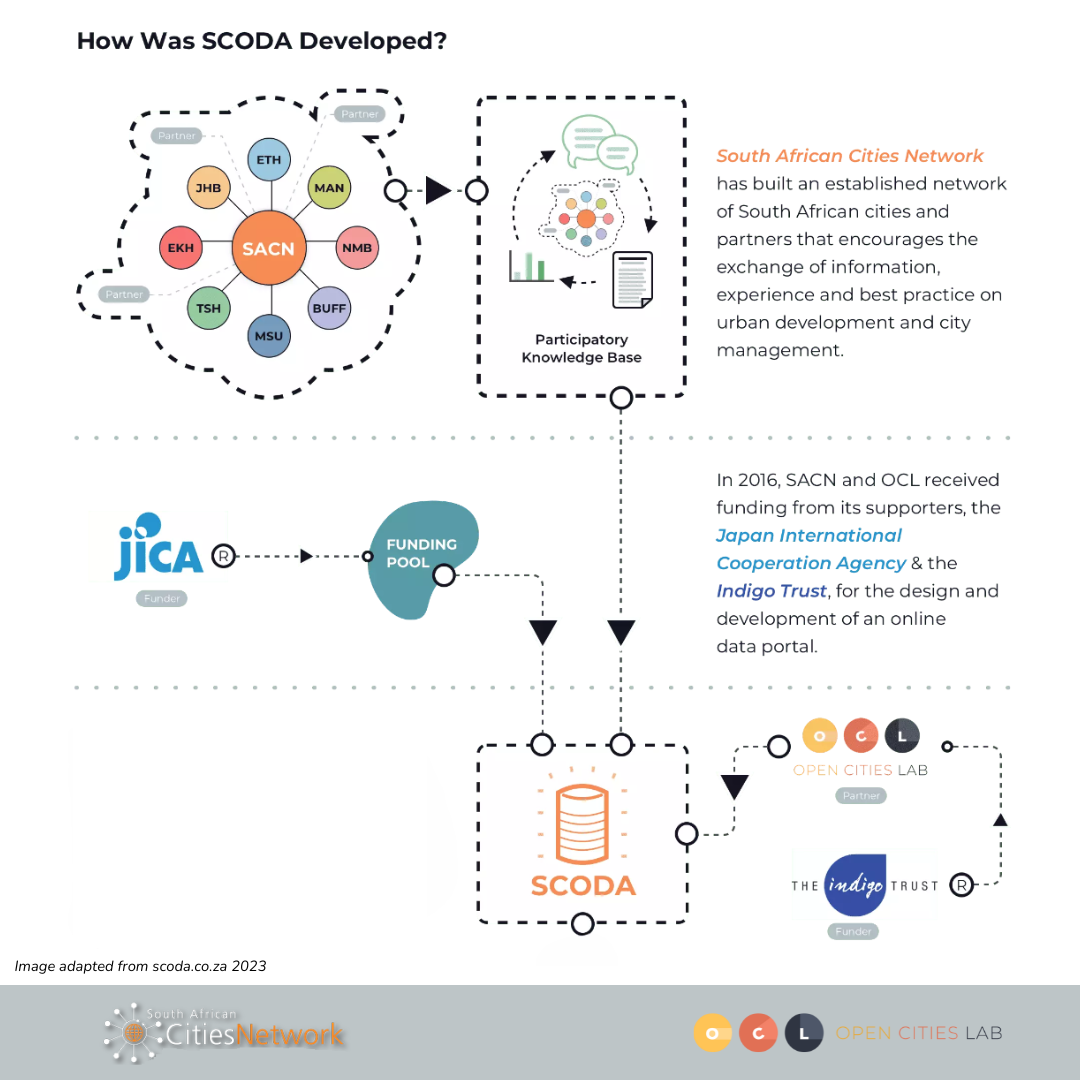
Before we delve into what SCODA is, its outcomes and its impact, we have to talk about the team and partnerships that made it possible. The South African Cities Network was established in 2002 as a network of South African cities and partners that encourages the exchange of information, experience and best practices on urban development and city management. South African Cities Network partnered with Open Cities lab to actualise the work that was started by the Reference Group into the SCODA platform. Relying on SACN’s long-standing partnership with cities and OCL’s technology and design expertise, OCL and SACN worked on unlocking city data for the benefit of city practitioners, residents and investors through the SCODA program for almost a decade.
SCODA is an element of a much larger attempt to leverage research, technology, user design, and data science to support city practitioners with data management and governance. The program mandate is to ensure that solutions are ultimately handed over to cities, and are determined by the city’s pace to achieve the required level of data maturity.
The SCODA Portal includes data tools, such as the Data Management System, Data Explorer, Codebook, Demographic Modeller, Custom-built data stories and dashboards, and State of City Report Dashboards. These tools allow users to:
- Store and share information in numerous formats,
- Get quick access to indicators in the database,
- Find relevant indicators by filtering by city reporting requirement, SACN themes and Sustainable Development Goals,
- View and analyse demographic projections,
- Explore custom-built data stories and dashboards.
OCL takes great pride in the partnerships we have been a part of and the invaluable tools that have been developed in collaboration with various city representatives. As we move forward in 2023, it is worth noting that Open Cities Lab has transferred the developed tools to SACN and its partner cities, marking a significant milestone in our journey together. With seven years of fruitful and productive collaboration, we now take a moment to reflect on this period of growth and achievement alongside our partners.
Summary of Program Outcomes
Over seven years, SACN and OCL worked in three cities, with eight city champions across five city departments to produce:
- 4 data portals
- 10 different types of custom civic-tech outputs/tools, including databases and APIs
- 33 data stories and 7 dashboards (and counting, including the ability for partners to upload these autonomously)
- 4 training modules, and
- 1 draft data strategy.
We have changed the city data ecosystem for the better with the SCODA portal and provided the capabilities for enhanced data pipelines and data sharing in 3 cities. We have empowered city champions and have carved out mechanisms to do data work in complex city spaces. The journey has not been without its challenges as adoption of the tools can be a complex process for cities, with other obstacles to overcome playing a pivotal role in impact. While we acknowledge the losses and challenges of SCODA, we are proud of the outcomes that have been achieved.
eThekwini Municipality: The Durban EDGE
The Durban EDGE is the public-facing brand associated with eThekwini Municipality’s Economic Development Unit. The unit was publishing economic insights via PDF before co-creating an open data portal through this project. The portal has been in use by the Durban EDGE team for over two years, averaging 1,600 visitors a month. The portal leverages the Data Management System and custom-built data stories and dashboards.
Johannesburg Municipality: Data Support Project
The City of Johannesburg’s data maturity is relatively high, however, their data work is siloed, and they have struggled to find the institutional mechanisms to integrate their varied but excellent data solutions. The Smart Cities Office, the Office of the Chief Operating Officer, and the Office of the Mayor have collaborated with SACN and OCL on various data support projects. Most notably, automating the COVID testing reporting pipeline for CoJ employees, and a prototype automated service delivery reporting pipeline and dashboard for improved area-based management.
Ekurhuleni Municipality: Data Support Project
The Knowledge Management Unit (KMU) at Ekurhuleni Municipality sees potential in having a data portal to manage and share data within the Municipality and with the public. We have worked with the project champion to develop their proof of concept portal with three exemplar dashboards, two exemplar datasets, and one exemplar data story.
Proving the power of civic technology
The need for civic technology in urban development cannot be overstated. As cities face an increasing number of challenges in the digital transition, it is critical that they are empowered to adopt technology and innovation solutions that are appropriate and suitable for their context (Jean-Paul et al, 2018 ).
The use of technology in the civic sector has the potential to create a sustainable impact and promote positive change, but it is also important to take into account the needs and interests of different stakeholders while building capacity within the government. Value exchange among all civic participants – beyond the financial, is critical. The empowerment of champions within government is essential in ensuring that initiatives are sustainable and effective.
The SCODA program has been successful in providing evidence-based decision-making and reporting tools to South African cities. The program has achieved its goals by developing a set of indicators that provides the evidence base for city performance and reporting, leveraging research, technology, user design, and data science to support city practitioners with data management and governance, ensuring that solutions are ultimately handed over to cities, and promoting the use of open-source, lower-cost technologies and methodologies as an option within city institutions. We look forward to seeing how the SCODA Platform and Program grow under the continued direction and support of the South African Cities Network.
The SCODA project was funded by the South African Cities Network; however the views expressed do not necessarily reflect those of SACN.
